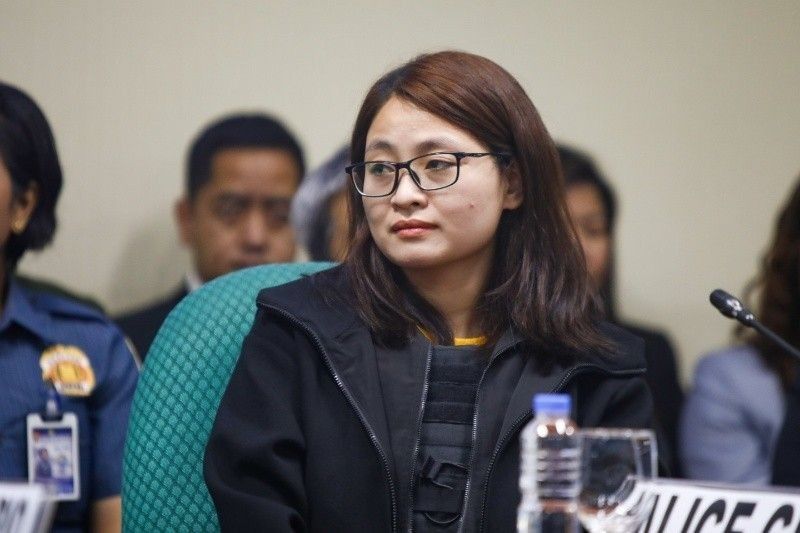Alice Guo seeks to run for reelection – lawyer

Guo, lawyer face perjury, falsification raps
MANILA, Philippines — Alice Guo will try to reclaim her seat as mayor of Bamban town in Tarlac in next year’s elections.
Guo’s lawyer Stephen David confirmed yesterday the dismissed mayor’s plan to file her certificate of candidacy (COC) for the 2025 polls.
“She will run,” David told TV5, adding that their legal team is preparing the required documents. “Why don’t we let the people decide kung gusto siya ng tao (if they want her)?”
Based on Commission on Elections (Comelec) rules, Guo may file her COC through a representative.
Guo, currently in detention over various charges, was dismissed from service by the ombudsman in August for grave abuse of discretion over the operations of a Philippine offshore gaming operator or POGO hub in Tarlac.
Although the ombudsman order carries a penalty of perpetual disqualification from public office, it may still be appealed and thus cannot be considered final and executory.
On “Storycon” on One News yesterday, Comelec spokesman Rex Laudiangco said the poll body would accept Guo’s COC should she file for the 2025 elections.
“It is the ministerial duty of Comelec to accept COCs,” Laudiangco said. He clarified, though, that acceptance does not mean that the person is automatically a candidate.
For the poll body to make a decision on the matter, he said a petition, either for disqualification or the cancellation of COC, must be filed against Guo.
“We ourselves are hoping that someone will file a petition to cancel her COC based on her qualifications, particularly concerning her citizenship. Somebody has to file the petition with the Comelec… We have to follow due process, a petition must be filed. It has to be heard. We cannot just automatically cancel a COC,” Laudiangco said
He added that any registered voter could file the petition and support it with evidence.
In case a petition is filed, Laudiangco said the Comelec would rule on matters involving a person’s eligibility to run for office, including those on the basis of citizenship.
Aside from a petition to cancel or deny due course to a COC, a petition for disqualification could also be filed against Guo using the ombudsman’s ruling as basis, he added.
Sen. Loren Legarda criticized Guo’s plan, saying the Comelec “should not allow her to run because her birth certificate has been cancelled” after it was proven to be “fraudulent.”
“We must not suffer in silence and be victimized by another Alice Guo, who is definitely a coddler of illegal criminal syndicates,” Legarda said.
Comelec Chairman George Garcia has committed to rule on all petitions this October, while appeals filed before the commission will be resolved by November, Laudiangco said.
NBI files raps vs Guo, 4 others
The National Bureau of Investigation, led by Director Jaime Santiago, yesterday filed before the Department of Justice (DOJ) complaints of falsification by a notary public, use of falsified documents, perjury and obstruction of justice against Guo, lawyer Elmer Galicia, who notarized her counter affidavit, and three others.
According to Palmer Mallari, NBI Task Force Alice Guo head agent, their investigation showed that Guo did not sign the notarized counter-affidavit submitted earlier to the DOJ, contrary to her testimony during a Sept. 17 Senate hearing.
The falsification, Mallari said, was determined after agents compared sample signatures found on original documents from Bamban local government and the purported signature on the counter-affidavit.
“It was proven that the sample specimen signatures from original documents from Bamban as compared to the supposed signature appearing on the counter-affidavit were not written by one and the same person,” Mallari said in a press briefing yesterday.
The questionable counter-affidavit was filed before the DOJ panel of prosecutors on Aug. 16 in connection with Guo’s human trafficking case. However, it was revealed by Sen. Risa Hontiveros that Guo fled the Philippines as early as July, drawing doubt as to the authenticity of the notarized document.
Galicia claimed he met with Guo on Aug. 14 to notarize the counter-affidavit at his notarial office in San Jose del Monte, Bulacan. But he also said that Guo did not personally swear before him, which was required by law.
Justice Secretary Jesus Crispin Remulla said the DOJ wants to see the case through, adding that Galicia should face a disbarment case over the fake counter-affidavit.
“As a message to our fellow lawyers, we should obey the law. If you are caught doing something it will be dealt with very severely,” he said.
Philippines investigates Chinese spy claim
Authorities are already looking into the claim of She Zhijang, a Chinese gambling tycoon detained in Thailand, that Alice Guo is a Chinese spy.
In an Al Jazeera documentary, She Zhijiang claimed to be a former spy for China’s Ministry of State Security and said that he and Guo Hua Ping, the alleged Chinese name of Alice Guo, dedicated their lives to China’s intelligence agency.
He urged the dismissed mayor to “tell the world the truth” if she does not want to be “eliminated.”
Santiago said the NBI is coordinating with its foreign counterparts in Thailand so they could interview him.
Remulla said the DOJ is taking the allegations “seriously” as Guo’s case also has national security implications, especially concerning her fake identity.
The Department of Foreign (DFA) is also taking the revelation seriously and is closely monitoring reports of foreign covert operations in the country.
“The Department has noted reports containing relevant information on alleged foreign covert operations in the Philippines. In accordance with its mandate to help protect national security, the Department takes such reports seriously and is monitoring relevant developments in this regard,” said DFA spokesperson Ma. Teresita Daza in a press briefing.
Also on track is the National Security Council, which is validating claims that Guo is a Chinese spy. NSC Assistant Director General Jonathan Malaya said these claims have security implications.
Tougher punishment
Defense Secretary Gilberto Teodoro Jr. called for an amendment of the country’s espionage law, seeking tougher punishment for those involved in these acts even during times of peace.
But Senate President Pro Tempore Jinggoy Estrada said he would wait for inputs from the defense department to fine-tune his proposed anti-espionage bill.
Estrada yesterday said he filed Senate Bill 2368 last year to amend the country’s “antiquated” espionage laws under the 1941 Commonwealth Act 616 and 1932 Revised Penal Code.
“I proposed this legislation long before the Senate began investigating the issues surrounding dismissed mayor Guo. The expansion of the coverage of espionage includes new provisions addressing cyber espionage. This legislation is a response to evolving threats and technological advancements that could compromise the country’s security,” Estrada said.
Spying for another country is punishable under Commonwealth Act 616 and the Revised Penal Code, which defines the crime as “being in possession, by reason of the public office he holds, of the articles, data, or information (of a confidential nature relative to the defense of the Philippine Archipelago)… and discloses their contents to a representative of a foreign nation.”
Estrada said espionage is currently punishable with 10 to 30 years in prison and a fine of P2,000 to P30,000. The Revised Penal Code sets a penalty of six months and one day to six years in prison.
“My proposed measure recommends the implementation of stiffer penalties, including life imprisonment and fines amounting to at least P1 million to bolster the safeguarding of government information and effectively address advancements in technology, encompassing electronic documents and cybersecurity,” he added.
Meanwhile, newly appointed Immigration Commissioner Joel Anthony Viado expressed support to modernizing the 1940 Philippine Immigration Act to improve securing the country’s borders.– Daphne Galvez, Pia Lee-Brago, Marc Jayson Cayabyab, Evelyn Macairan
- Latest
- Trending






























